
Subscribe to continue reading
Subscribe to get access to the rest of this post and other subscriber-only content.

Subscribe to get access to the rest of this post and other subscriber-only content.



“He’s gorgeous!” enthused Caro by WhatsApp. It was not the response I was hoping for. I’d just sent her a photo of the pig sculpture in the pond outside the Harlow civic centre which I deemed awful and cousin Pat said was wonderful. The sculpture is officially titled “Boar” and is part of the sculpture collection of Harlow, a relatively new town some 30 minutes by train north of London. I prefer to call it the “Wonky Pig” as to me it looks like it’s on the verge of falling over – a bit like I do to a lot of people.
I’d enlisted Caro’s opinion as she’s qualified with a degree in fine art and should know about these things – i.e. is it good art? Of course liking art is in the eye of the beholder; it doesn’t make it good, at least not in my opinion. Cousin Pat was silent on the matter but I detected an aura of smugness. Further along the pond was a bird. Well, that’s what the plaque said but I’ll leave it to the reader to decide what it might be. The last sculpture in the pond was a copy of Rodin’s “Eve” which even I could appreciate.
We were coming to the end of our three week holiday in the UK having visited friends and relatives and were looking forward with a mix of trepidation to returning to the chaos of Zimbabwe. England works. Zimbabwe not so much. We’d experienced first hand the motorway driving which is the antithesis of Zimbabwean driving. We’d seen a show in London, done the tourist bit on a tour bus and caught up with old friends. The weather had been surprisingly good but we were also getting tired of living out of suitcases and were looking forward to getting back to our own space and the dogs.







After the long night flight from Johannesburg we landed at Heathrow Terminal 5 and made our way into London. As a disabled person it was comforting to find that getting assistance was easy, something that we found throughout our trip.
Porlock was a three hour trip; train from London to Taunton, bus to Minehead and a short taxi ride to Porlock where we stayed not far from Meryl Harrison, an old friend of Marianne’s. Meryl is well known in in Zimbabwe for her single minded and courageous rescues of farm animals in the chaotic years surrounding the farm invasions in Zimbabwe. She was also instrumental in setting up the VAWZ animal charity. Now she lives in retirement in the country of her birth. She would prefer to live in Zimbabwe but cannot afford to. You can support her by buying her book Innocent Victims about the farm rescues.
Don, another friend of Marianne’s from long ago, had agreed to meet us in the area and take us exploring with his wife Rachel and three dogs. We took a drive up onto Exmoor nearby and onto the twin towns (or is it one?) of Lynton and Lynmouth. It’s famous for its funicular water-powered cliff railway that opened in 1890 and, yes, still works today.
There are two carriages on a cliff that take passengers up and down. Both have water tanks beneath them – clearly seen in the photo above. The descending carriage has a full tank and the ascending one an empty tank so gravity does the work.
Pubs in the area were of course also visited and being just out of tourist season we had no difficulty finding space for lunch. There was just one day that rain curbed our plans but other than that it was cool and clear. Autumn colours were just starting on the moor.
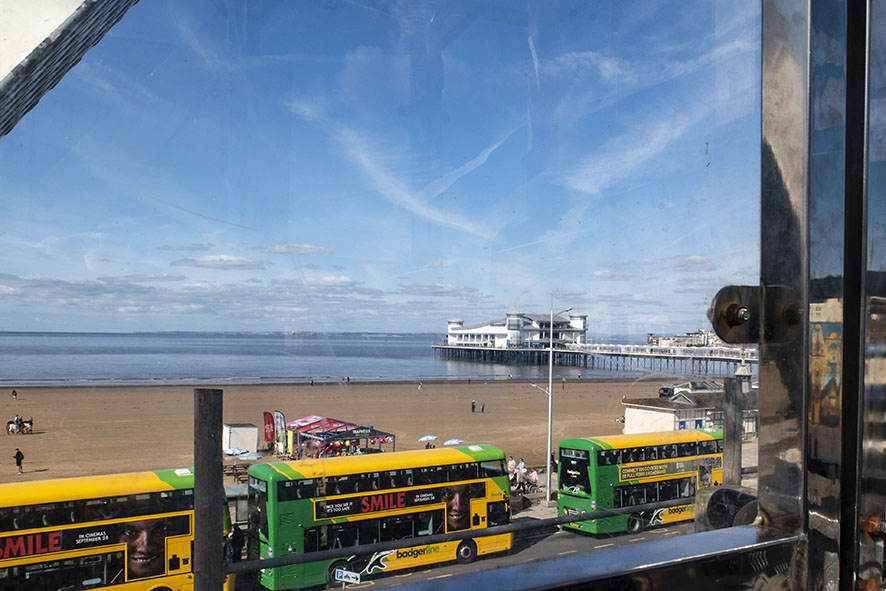

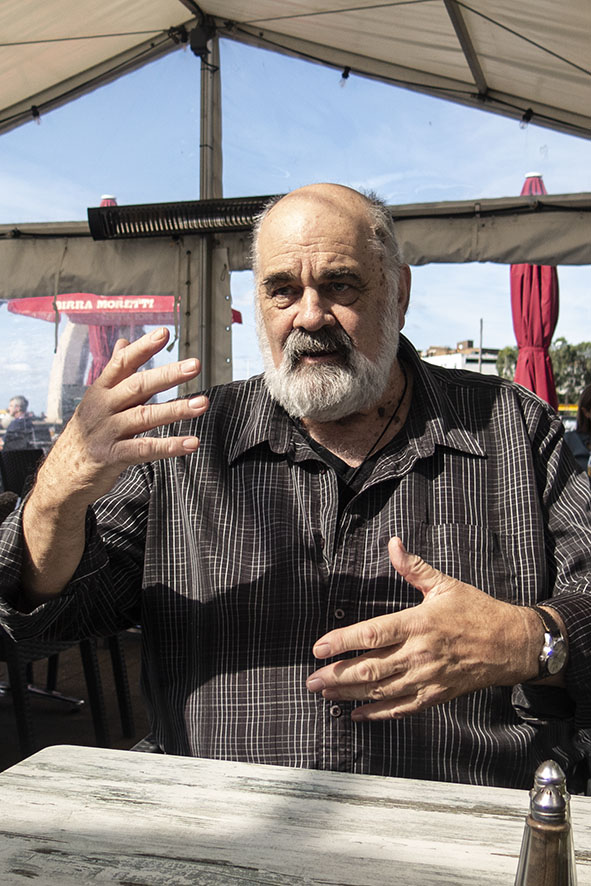
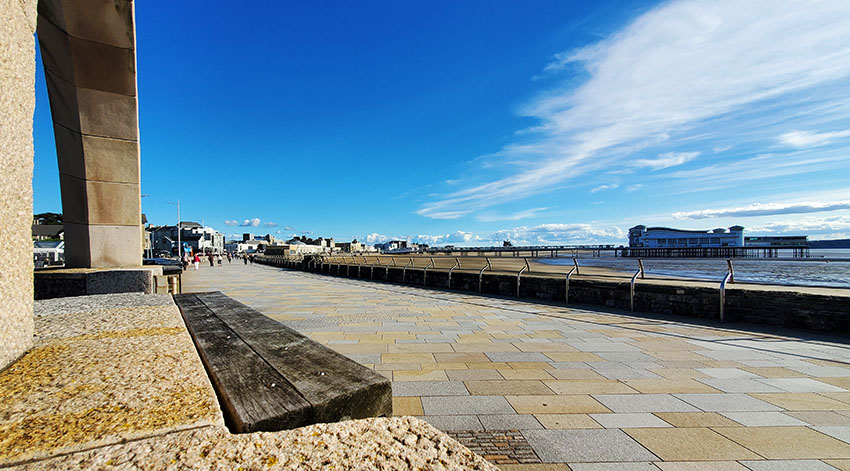
Our next stop was Weston-super-Mare about and hour towards Bristol. Don kindly did a small diversion to drop us there where we’d found a convenient B&B close to the beachfront. We were glad to be there out of season so had no crowds to negotiate and didn’t even have to queue for the ferris wheel.
The first day we explored the nearby helicopter museum and the following day cousin Malcom came out from Bristol for an entertaining lunch.





The Helicopter Museum is billed as having the biggest collection of helicopters anywhere in the world. I can believe it – they were really packed in. There was even a Vietnam veteran Bell Huey complete with armaments. I never flew in one in my military days though they were around. We deemed them unsuitable for the type of bush warfare we were fighting as they could be heard a long way out. Ironically I did get a casevac ride in a US Navy Huey in 2002 (see the Reflections on the first half post). They did have an Aerospatiale Alouette II which is the predecessor of the III. I spent many hours flying around the countryside in the latter. Though small they could carry four lightly armed troops, a pilot and a technician/gunner and were ideally suited to bush warfare.
Perhaps the star of the show was G-LYNX, the Westland Lynx that set the world speed record for a conventional helicopter in 1986 and it still stands to this day. Surprisingly the only major modification was to the rotor blades, the rest of the machine was pretty much standard. Of course there were some very early helicopters that had a much less distinguished career.
My brother Duncan picked us up on the third day and we made our way back to his home in Baschurch, Shropshire via an old school friend in Droitwich. Cathy was a sporting lass in her youth and held a number of athletics records. Once when playing cricket at our house she bowled to Duncan who hit the ball through a closed window and hit Cathy’s father Geoff on the head. Duncan blamed Cathy for her poor bowling.

It was good to catch up with his family whom we’d last seen four years ago. His eldest son, Frazer, no longer lives at home but we did manage a dinner in the nearby town of Shrewsbury where we caught up with him and his partner.
The funeral of Queen Elizabeth was on whilst we were there. Yes, we did watch the pomp and ceremony for a while and yes, as a British citizen she was my head of state but there is only so much of that sort of thing I can watch so in the afternoon we did other things. We went off to a local garden centre where, amongst other attractions, they had a cunning system whereby a pound bought a little tub of fish food to feed their koi. Neat!

While we were there Duncan suggested a trip to the RAF Cosford museum. It’s vast so luckily we managed to get use of an electric mobility scooter for me.



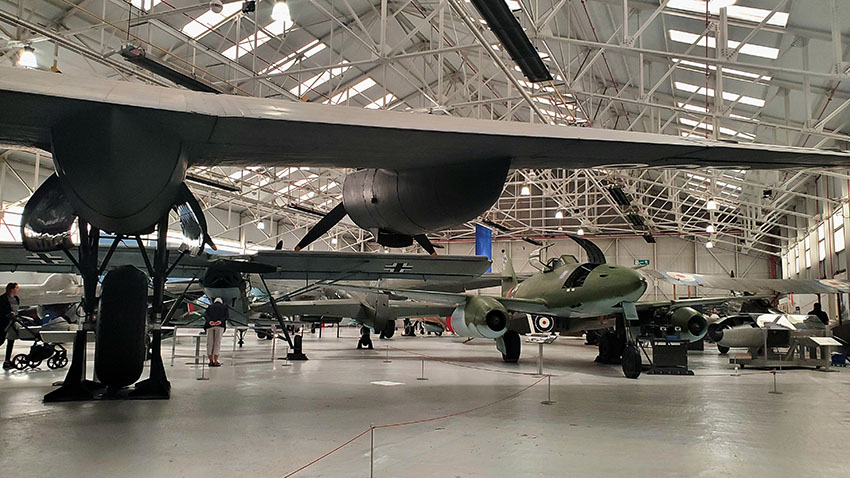






The British do museums well and this one is an exceptional example and it’s free but beware, in the holiday season you may need to book.
As a child I was captivated by a “Boys’ Own Annual” story of the BAC TSR-2, an extraordinarily advanced (a perhaps overly ambitious design) multi-role attack/reconnaissance aircraft so I was particularly pleased to see a real one. We didn’t get to see the final hanger as it was time to go and rescue Marianne from her favorite pastime of shopping in Telford.
From Shropshire we went on to Shirebrook where Gordon and Judy Grierson live. They are also economic refugees from Zimbabwe. Several years ago they decided they could not afford to live in Zimbabwe any longer as they were both getting on in age so they decided to move to Englalnd where Gordon has two sons. They sold their property here for a decent price but getting they money out proved problematic so now they just get by and long for Zimbabwe.
Shirebrook is an unremarkable town with a lot of older folk and an amazing Indian restaurant. It does have a large garden centre nearby which we visited out of curiosity. We have nothing like it in Zimbabwe and I think there is potential for something along similar lines.
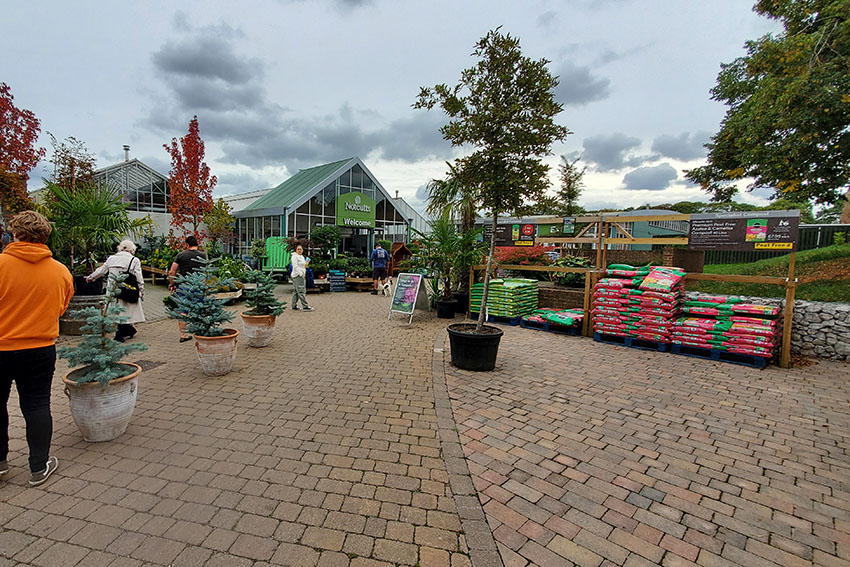
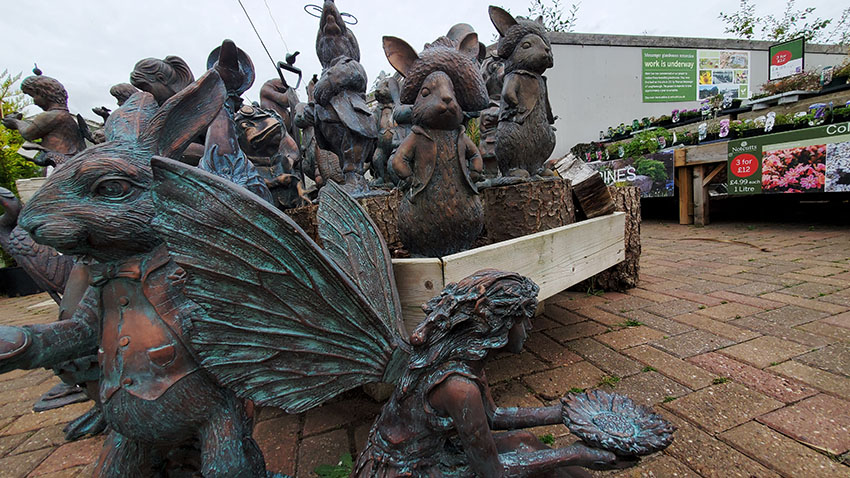


I was not overly-impressed with the quality of the plants but to be fair autumn in the UK is not prime gardening weather. There was much else that was only vaguely related to gardening – mead comes to mind.
From Shirebrook we caught a train to London where we’d promised ourselves three nights of entertainment and the tourist thing. Marianne had found a reasonably priced hotel close to Leicester Square in central London that was in walking distance of a theatre showing Moulin Rouge. We both decided that whilst the sets were magnificent and the dancing good, the acting left a bit to be desired. At half time Marianne decided a flute of champagne would be nice but balked at the 17 pounds price.



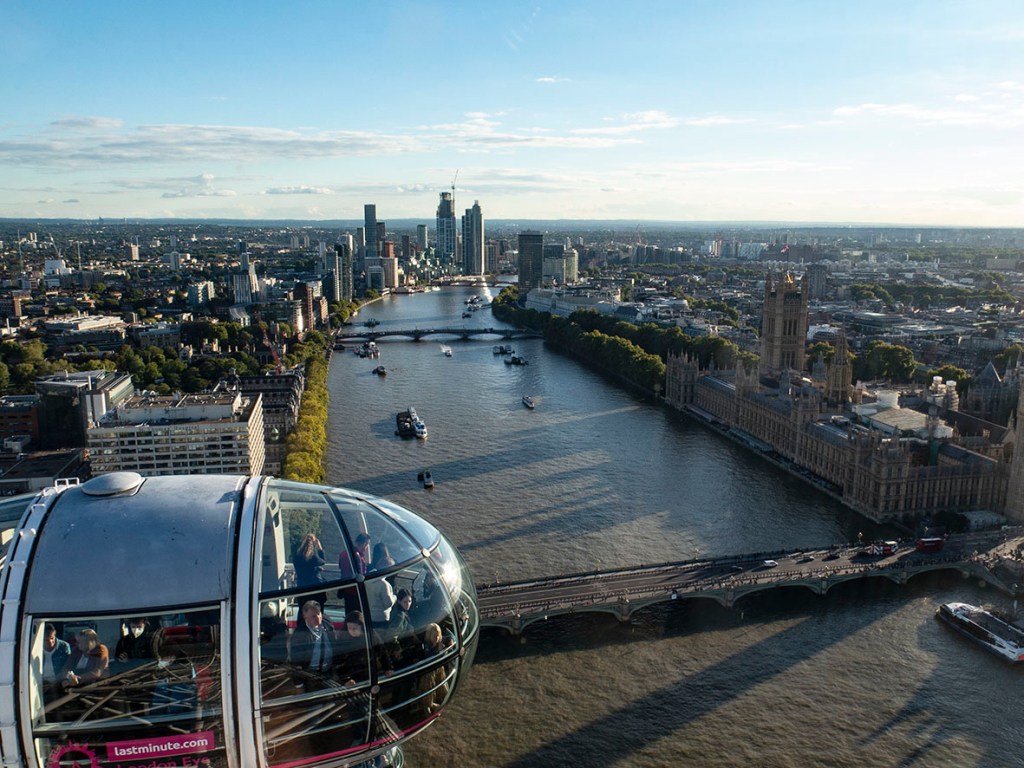





The next day we went to the Imperial War Museum that I’d last visited in 1987. I was impressed back then but it’s undergone a substantial facelift since then and we saturated ourselves on the floor that dealt with World War II. It was very well done with lots of small placards that gave personal stories of often ordinary people on all sides of the conflict. It’s not something that one can really absorb in one session. There were a lot of school children around and I really felt the enormity of the event was lost on them – it was just a morning away from school.
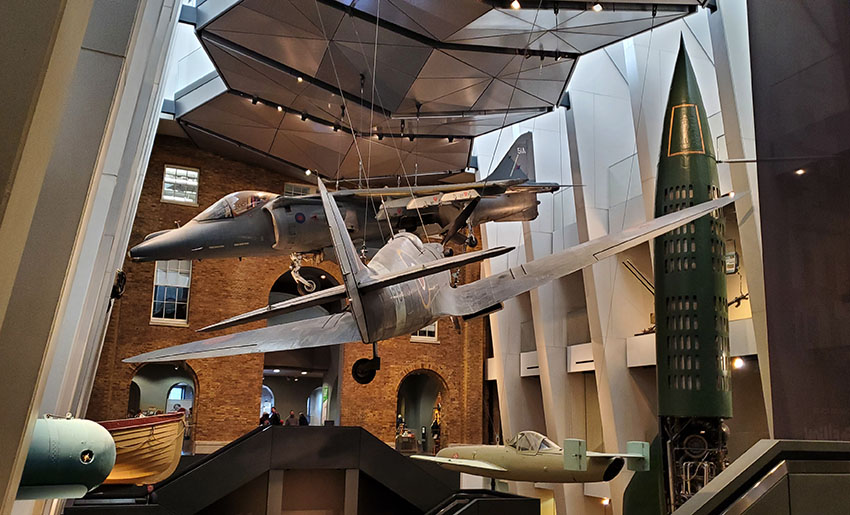
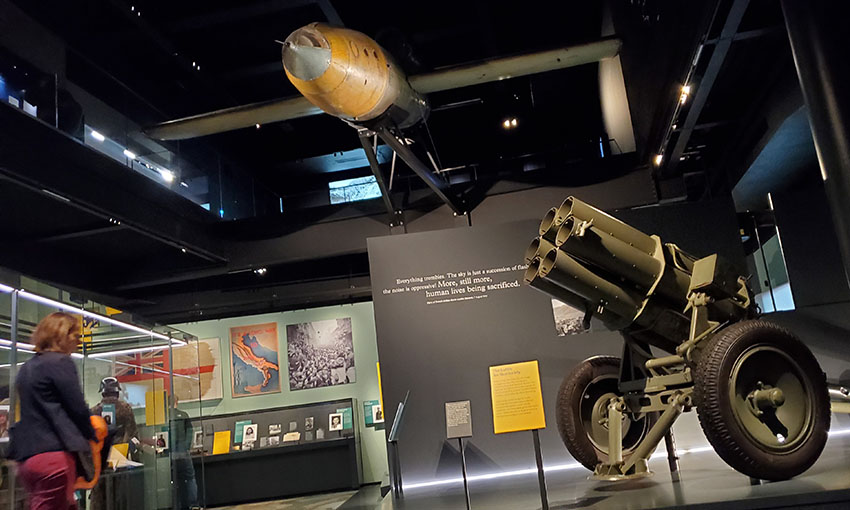






For me it was a crystal clear reason why we never want to go to this extreme again. By the end of the display I was more than a little depressed but the final straw was the video of bodies being bulldozed into mass graves in the German death camps. As a veteran of a vastly smaller conflict I have seen more than a few dead bodies but this made me feel ill.
The generation that fought in World War II is often referred to as the “greatest generation”. My father served in the RNVR as a sub-lieutenant and try as I may, I could not get him talk much about it. He said he did not see much action but was on historic ships; HMS Savage, HMS Jamaica and HMS Norfolk but was not onboard the latter at the time of it’s action against the Bismarck.
Peter Danby, who lived in my mother’s village of Penhalonga in the east of Zimbabwe, had been a commander in the Royal Navy and had been in an irregular unit (I never found out it’s name – perhaps a forerunner of the SBS?) that did hit-and-run raids on German shipping in the Greek archipelago. I commented that it must have been “exciting”. He replied “yes it was quite” and that was the end of the conversation. We owe it to the exceptional and oft understated bravery of this generation that a catastrophe of this magnitude never happens again.
The next day we did the tour bus thing and were lucky to get a good commentator. It was double-decker bus and I couldn’t manage the stairs so we had to be content with a street eye level view. A short cruise up the Thames took us passed all the major sights. Once again we were lucky with the weather and the grand finale on the London Eye was well worth the wait. The tour guide noted that in peak season the Eye can take 500,000 pounds a day. We were lucky and did not have to queue at all and the pods were perhaps half full.
En route to the London Eye we went past the Houses of Parliament and Buckingham Palace – the armed police presence was very noticeable. There were the obligatory guards on horses but I did wonder if they carried loaded weapons.
We did not of course “eat in” at night (the hotel did an uninspiring breakfast) and tried to find reasonably priced restaurants close to where we were staying. We had mixed success with the food quality but prices were all much the same – high. I told Marianne we hadn’t come on holiday to lose weight or save money and so we tucked in.
Then it was on to cousin Pat and finally home after three weeks away. It was a good holiday, thanks in no small part to Marianne’s organisation skills. We saw the people we wanted to see and saw sights that I wouldn’t have done by myself. Now we are back in stress land and plotting the next escape – more on that another time.
I haven’t been lazy in posting to this blog – I have been out to play! Three weeks away in the real world in Europe where the cops are not on the take, the public transport is on time and the trash is picked up – mostly. Getting off the Eurostar at Gare du Nord in Paris the cigarette butts on the railway tracks were very obvious despite the announcements that it was “absolument inderdit” (definitely prohibited) to smoke in the station or on the platforms. Very French to thumb your nose at the authority a bit – like the girl with her dog on the scooter outside the Moulin Rouge where the dancers wore more makeup than clothes. It was a LOT of makeup and yes, not a lot of clothes.
It was good to get back to Annecy where I’d flown in 2004 though this time I did not have my paraglider with me so went off to the flying festival at St Hilaire to check out the trade show, flying displays and of course the masquerade though it was difficult to get close to the latter due to the crowds. Around 80,000 people attend of the 4 days that it runs – mostly day trippers from Grenoble. An amazing atmosphere.
Back in Paris it was time for the Eiffel Tower where there were no queues as it was well out of tourist season and I even saw a Rhodesian Ridgeback dog being walked there. The parisiennes really do have good taste!
Then over to London for some brief shopping (why walk when it can all be done on the internet and delivered?) and a day at the Natural History Museum. The Brits do some things very well and this is one of them. A day did not even begin to cover what was on display. And there were free talks by scientists on their area of speciality in the evening.
I have a brother in Shropshire so went up there for a week and met up with cousins and went on a day trip to nearby Chester in England (part of it is in Wales). An example of how tourism can be done well. Take a few lessons Zimbabwe!
Now I am back in the heat and the dust and the uncollected rubbish in Zimbabwe. The South African truck drivers on whom we are dependent for just about everything are on strike so it’s time to do some serious shopping. Kharma is delighted that I am back. It’s home.
The curse of good health
13 08 2015My uncle turns 93 or maybe it’s 92 this year. Mentally he’s very sharp but physically he’s frail. Last year he decided he’d had enough of life and decided to end it on his terms. He failed and now he’s condemned to a old age home in rural England, waiting to serve his time amongst the old, frail and demented.
I went to visit him the week before last whilst on an infrequent trip to a family gathering and the wedding of a young friend. We don’t get together much; my brother lives in the UK, my sister in north-western USA and I’m in Zimbabwe. It was my brother’s 60th birthday last weekend and I’d said to my sister-in-law that I’d come over for it if he promised to have a party.
Lucy and Will’s big day
It was pure luck that Lucy was getting married the weekend before and well, I probably won’t see Ant again.
The UK is unlike Zimbabwe in many ways;
Clean
Organised
Good roads
Horrendously heavy traffic but a noticeable absence of bad drivers (ok so it wasn’t a dangerous breach but it’s still a red light!)
Crowded
Green (Zim is very dry right now
In short – First World!
So whilst in London we did the tourist thing, the Science Museum to get my dose of science.
Tower Bridge on the Thames
Dining hall at the old Naval Academy.
The Cutty Sark
A Thames river cruise to the Cutty Sark and checked out the amazing dining hall at the old Naval Academy. Zimbabwe does not have recorded history going back that far and we don’t have a navy either. We do however have better weather than the UK though on this trip it wasn’t bad, choosing to rain just when I chose to do some serious photography.
Getting back to Harare we encountered some decidedly Third World air service with all the luggage being left in Johannesburg because there was no Jet A1 fuel in Harare. Well, that was the official story. It is certainly symptomatic of the state of the economy here and meant that we had to go back to the airport the next day to collect our luggage (don’t they deliver it elsewhere?). So my Saturday visit to the Gallery Delta had to wait a week.
The current exhibition there is From Line to Form where Wallen Mapondera’s string picture Everyone is a Vendor neatly caught the dire state of the economy; we just don’t produce much anymore.
Everyone is a vendor
Not at all like the market we visited in the curiously named Bury St Edmond where it was very hip to buy local produce. Not sure if these tomatoes were local but they are certainly better quality than the ones we get here!
Good quality produce
When I left Ant I shook his hand. His grip was firm by any standard. He just laughed when I mentioned it. Handshake strength is one of the criteria used to asses old people’s health. I winced inwardly at the irony of it.
Comments : 4 Comments »
Tags: Bury St Edmund, Cutty Sark, London, Naval Academy, River Thames, Tower Bridge, Zimbabwe economy
Categories : Social commentary, Travel